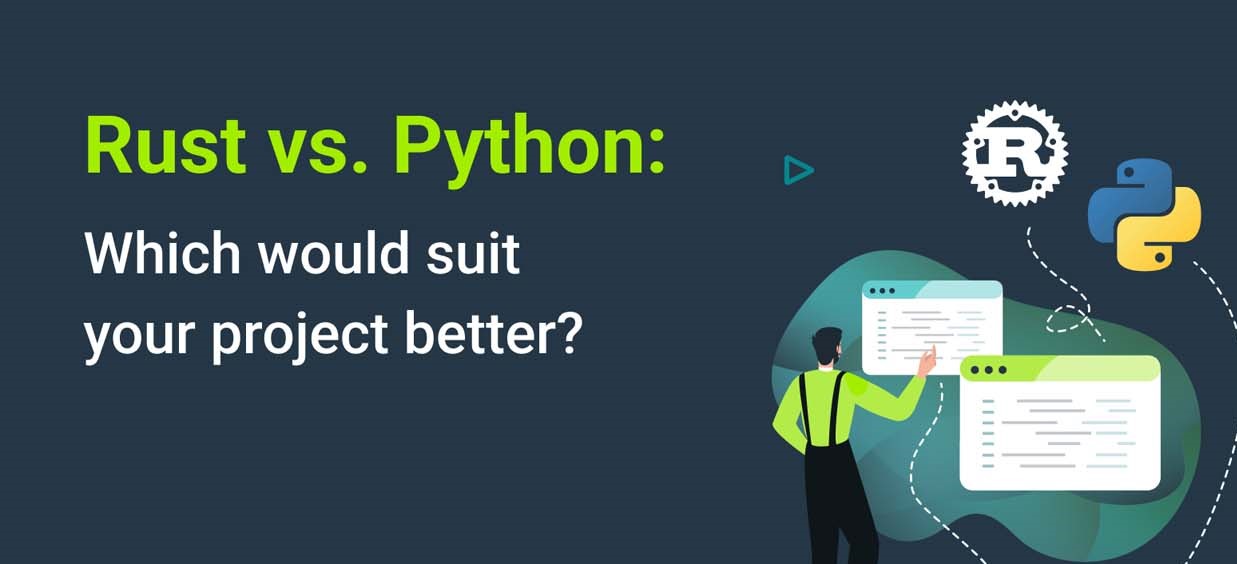Choosing the right programming language for your project can be a critical decision, as it can significantly impact development speed, performance, and maintainability. Two popular languages, Rust vs. Python, offer distinct features and are suitable for different types of projects. In this blog post, we will compare Rust and Python across various aspects, helping you make an informed decision based on your specific needs.
Comparison Table
Let’s begin with a high-level comparison table summarizing key attributes of Rust and Python:
| Attribute | Rust | Python |
|---|---|---|
| Performance | Highly efficient and fast | Interpreted and slower |
| Memory Management | Systematic memory control | Automatic garbage collection |
| Typing System | Strong and static | Dynamic and weak |
| Concurrency | Excellent support for concurrency and parallelism | Limited support |
| Safety | High-level memory safety, no null pointers | Limited memory safety |
| Community | Growing and active | Large and active |
| Ecosystem | Expanding but smaller | Vast and diverse |
| Use Cases | Systems programming, embedded systems, performance-critical applications | Web development, data analysis, scripting, AI/ML |
| Learning Curve | Moderate, requires understanding of ownership, borrowing, and lifetimes | Low, easy to learn and use |
| Popularity | Increasing in popularity | One of the most popular languages |
Now, let’s delve deeper into each of these attributes:
- Performance:
- Rust is known for its impressive performance, making it a go-to choice for systems programming and applications where speed is crucial.
- Python, on the other hand, is an interpreted language, which means it tends to be slower than Rust. However, Python’s extensive standard library and the ability to integrate with C/C++ code can mitigate this limitation.
Unlocking Mobile Potential: The Power of Software Development Kits (SDKs)
- Memory Management:
- Rust provides fine-grained control over memory with its ownership and borrowing system, eliminating common issues like null pointer dereferences and data races.
- Python uses automatic garbage collection, which simplifies memory management but can lead to performance overhead.
- Typing System:
- Rust has a strong and static typing system, catching many errors at compile-time.
- Python employs dynamic typing, which allows for flexibility but can lead to runtime errors.
- Concurrency:
- Rust offers excellent support for concurrency and parallelism with its ownership model, making it easier to write safe, concurrent code.
- Python’s Global Interpreter Lock (GIL) restricts true multi-core parallelism, limiting its performance in concurrent tasks.
- Safety:
- Rust’s strong type system and ownership model make it a safe language, preventing common memory-related errors.
- Python provides some safety through exceptions, but it doesn’t have the same level of memory safety as Rust.
- Community:
- Both Rust and Python have active and supportive communities, providing resources, libraries, and documentation.
- Ecosystem:
- Python boasts a vast ecosystem with libraries for virtually every domain, including web development, data science, and machine learning.
- Rust’s ecosystem is growing but is not as extensive as Python’s, particularly in specialized domains.
- Use Cases:
- Rust shines in systems programming, embedded systems, and performance-critical applications.
- Python is ideal for web development, data analysis, scripting, and AI/ML due to its ease of use and extensive libraries.
- Learning Curve:
- Rust has a moderate learning curve, especially for those new to systems programming, due to its ownership and borrowing concepts.
- Python is renowned for its simplicity and ease of learning, making it an excellent choice for beginners.
- Popularity:
- Rust’s popularity is on the rise, particularly in the systems programming domain.
- Python remains one of the most popular programming languages globally, thanks to its versatility.
Choosing the Right Framework for Migrating Java EE Applications to Microservices
Here are some FAQS based on Rust and Python
- Is Rust better than Python?
- Rust and Python serve different purposes. Rust excels in systems programming and performance-critical applications, offering control over memory and safety. Python is better suited for web development, data analysis, and ease of use. Which one is “better” depends on your project’s requirements.
- Will Rust replace Python?
- Rust is unlikely to replace Python entirely. While Rust is gaining popularity, Python’s extensive ecosystem and ease of use make it irreplaceable in certain domains. They can coexist and complement each other in many scenarios.
- Is Rust or Python better for machine learning?
- Python is the preferred choice for machine learning due to its rich libraries like TensorFlow, PyTorch, and scikit-learn. Rust is not as mature in this domain, so Python remains the dominant language for machine learning projects.
- Can I learn Rust after Python?
- Yes, you can learn Rust after Python. While they have different syntax and paradigms, having experience with Python will help you understand programming concepts. Rust may have a steeper learning curve, but your Python knowledge can be an asset as you delve into Rust.
In summary, the choice between Rust and Python depends on your project’s requirements. If you prioritize performance, memory safety, and fine-grained control, Rust is an excellent choice. On the other hand, if you need a language for rapid development, extensive libraries, and a straightforward learning curve, Python is a strong contender. Ultimately, both languages have their strengths, and the decision should align with your specific use case and development goals.

